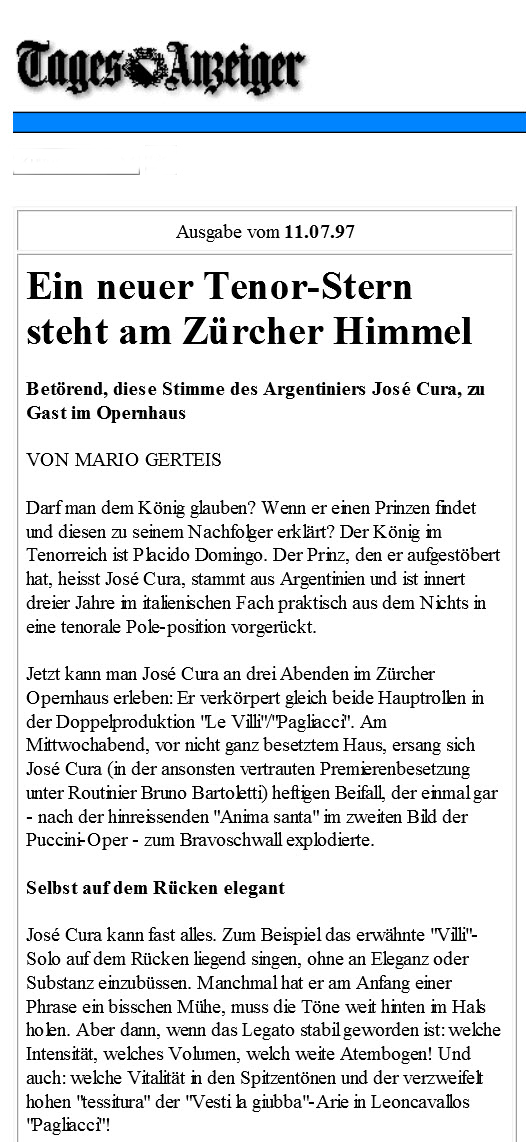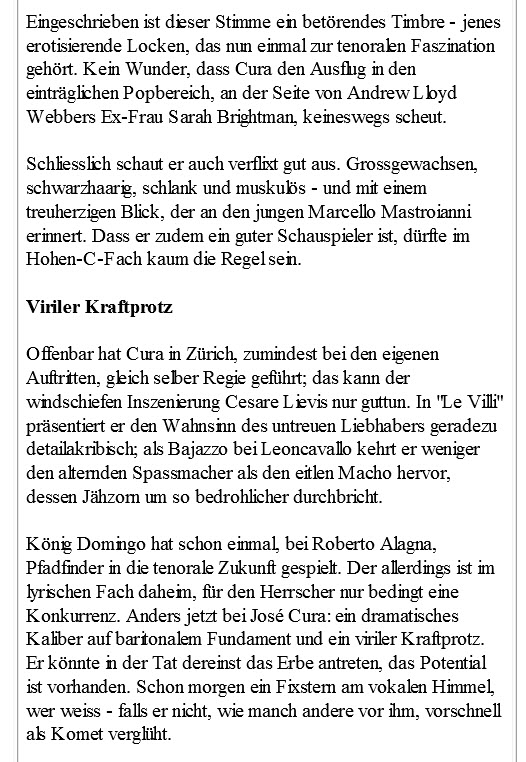|
|
Bravo Cura
Celebrating José Cura--Singer, Conductor, Director
Operas: Le Villi
|
Year |
Month |
Day |
Opera |
Composer |
Theater |
Location |
Country |
|
2007 |
March |
7, 9, 11 |
Le villi |
Puccini |
Teatro Carlo Felice |
Genoa |
Italy |
|
2006 |
May |
15, 19, 23, 26 |
Le villi |
Puccini |
Staatsoper |
Vienna |
Austria |
|
2006 |
September |
8, 10, 14, 18 |
Le Villi |
Puccini |
Staatsoper |
Vienna |
Austria |
|
2005 |
October |
23, 25, 29 |
Le villi |
Puccini |
Staatsoper |
Vienna |
Austria |
|
2005 |
November |
1, 3, 6 |
Le villi |
Puccini |
Staatsoper |
Vienna |
Austria |
|
1997 |
July |
9, 12 , 17 |
Le Villi |
Puccini |
Opernhaus |
Zürich |
Switzerland |
|
1994 |
July |
31 |
Le villi |
Puccini |
Ducal Palace |
Martina Franca |
Italy |
|
1994 |
August |
2 |
Le villi |
Puccini |
Ducal Palace |
Martina Franca |
Italy |
Le Villi
Martina Franca - 1994
|
Le Villi, Martina Franca, 1994: “The Argentine tenor José Cura, a truly great performer with a vocal instrument beyond the common, very strong and expressive, imposed himself in the role of the main character, showing that he is an authentic spinto-drammatico tenor, a register today quite rare. Cura, besides a big and beautiful voice, has the stage power of a true actor.” Il Quotidiano, August 1994
Le Villi, Martina Franca, 1994: “The success [of the production] was due not only to Puccini’s music, but to the enthusiasm shown by the young, gifted singers. The Argentinian tenor José Cura, who is already making a name for himself in important theatres like the Regio in Turin, characterized the ambiguous Roberto well; he also displayed natural stage skills in the difficult action of the second act.” Opera, Festival 1994 Edition |
|
|
Le Villi
Zurich - 1997
|
|
|
 |
 |
|
Note: This is a machine-based translation. We offer it only a a general guide but it should not be considered definitive.
A New Tenor Star is in the Zurich Sky Tages-Anzeiger Mario Gerteis 11 July 1997
Bewitching, this voice of the Argentinian José Cura, guest at the opera house Can the king be believed? What if he finds a prince and declares him his successor? The king in the tenor realm is Placido Domingo. The prince he found is José Cura, who is from Argentina and has, within a space of three years, moved from practically nowhere into the tenoral pole position in the Italian repertoire. Now you can experience José Cura on three evenings in the Zurich Opera House where he plays both leading roles in the double production Le Villi / Pagliacci. On Wednesday evening, in front of a not quite full house, José Cura (in the otherwise familiar premiere cast under veteran Bruno Bartoletti) earned himself fierce applause, which once even exploded into a torrent of bravo - after the ravishing Anima santa in the second act of the Puccini opera. Elegant even on his back José Cura can do almost anything. For example, singing the aforementioned Villi solo lying on his back without sacrificing elegance or substance. Sometimes he has a bit of trouble at the beginning of a phrase and has to get the notes far back in his throat. But then, when the legato has become stable: what intensity, what volume, what wide breathing arcs! And also, what vitality in the top notes and the desperately high "tessitura" of the Vesti la giubba aria in Leoncavallo's Pagliacci! Inscribed in this voice is a beguiling timbre - that eroticizing curl that is part and parcel of tenor fascination. No wonder Cura doesn’t shy away from a foray into the lucrative pop area alongside Andrew Lloyd Webber’s ex-wife Sarah Brightman. After all, he looks darn good too. Tall, black-haired, slim and muscular - and with a sincere look that is reminiscent of the young Marcello Mastroianni. That he is also a good actor is hardly the norm in the High C Fach. Virile Powerhouse Apparently, Cura directed in Zurich, at least for his own performances; that can only be a good thing for Cesare Lievis' warped productions. In Le Villi he [Cura] presents the madness of the unfaithful lover in detail; in Leoncavallo’s Pagliacci he is less the aging fun-maker than the vain macho, whose anger is all the more menacing as a result. King Domingo has already played scouts into the tenoral future with Roberto Alagna; however, Alagna is more at home in the lyrical arena and offers only limited competition for the ruler (Domingo). Cura is different: a dramatic caliber on a baritonal foundation and a virile powerhouse. Indeed, he could one day inherit the legacy, the potential is there. Who knows? Tomorrow he may well be a fixed star in the vocal sky—if he does not, as many others before him, burn up prematurely as a comet.
|
|
Le Villi
Vienna - 2005 - 2006
|
|
Le Villi
Genoa - 2007
|
|
|
|
Last Updated: Wednesday, July 31, 2024 © Copyright:
Kira